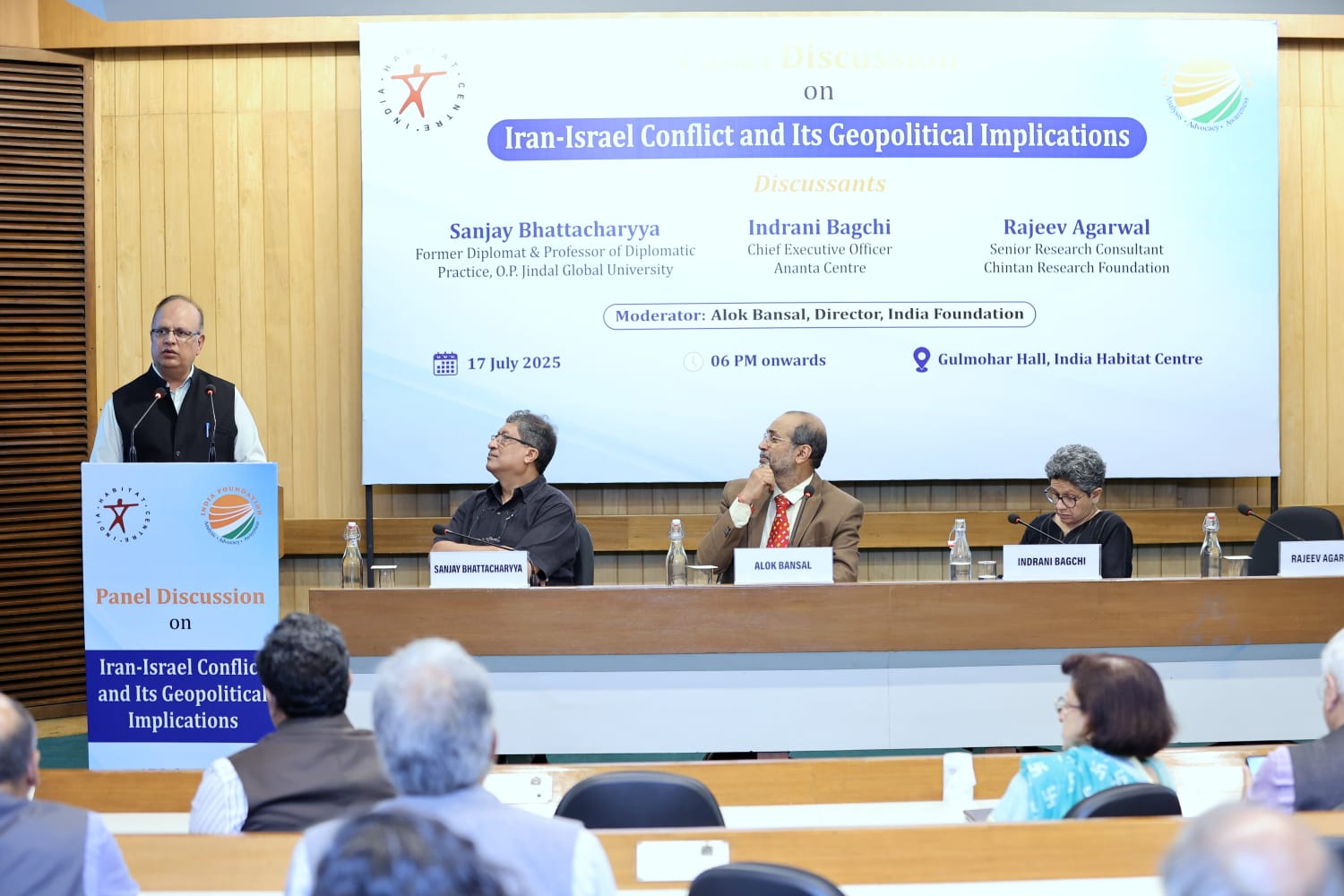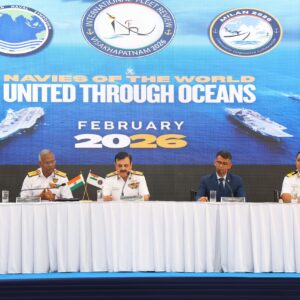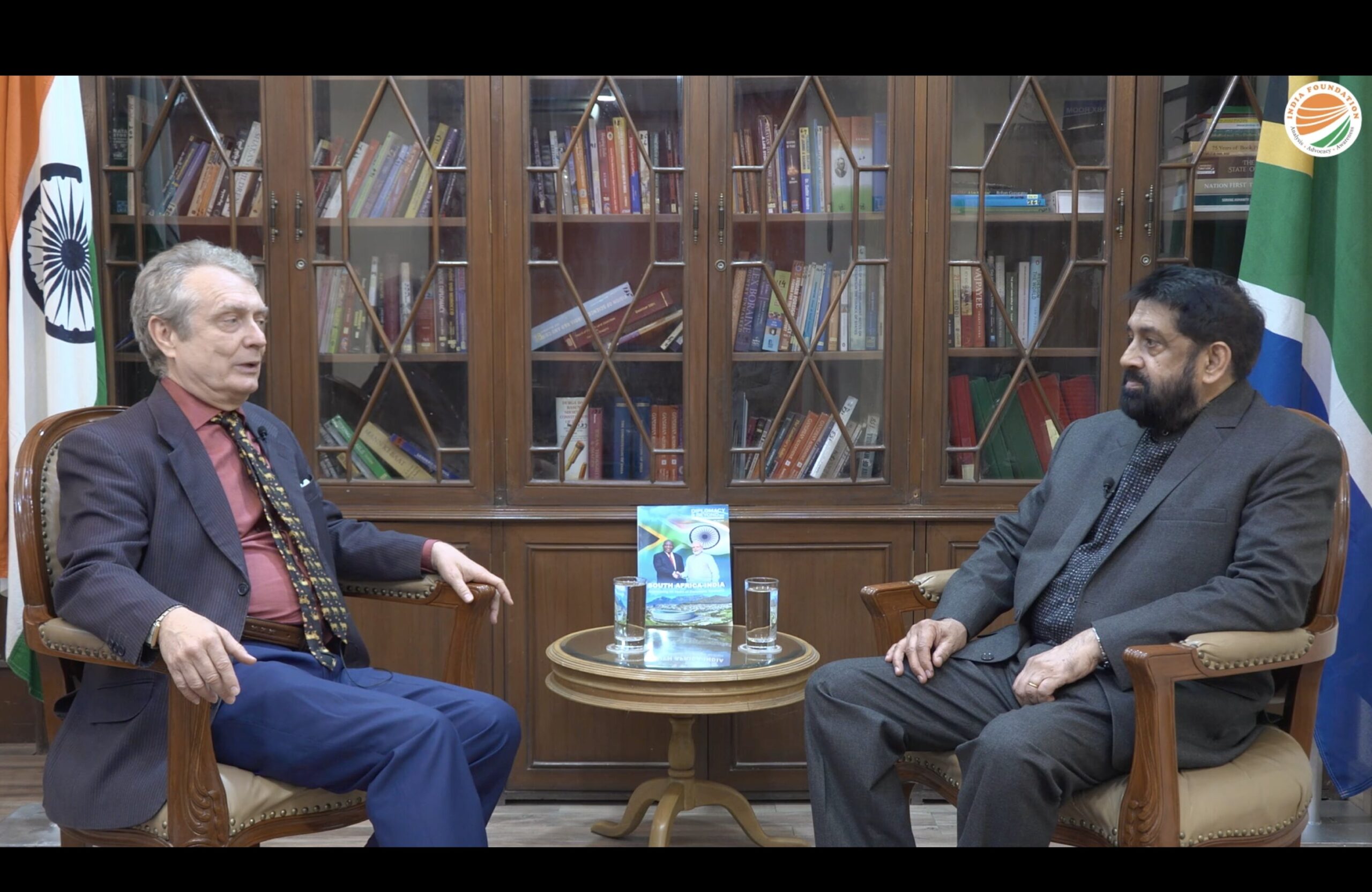India Foundation, in collaboration with India Habitat Centre, organised a panel discussion on ‘Iran-Israel Conflict and Its Geopolitical Implications’ at Gulmohar Hall, India Habitat Centre, New Delhi on 17 July 2025. The panelists for the discussion were Prof. Sanjay Bhattacharyya, Former Diplomat & Professor of Diplomatic Practice, O.P. Jindal Global University, Ms Indrani Bagchi, Chief Executive Officer, Ananta Centre & Col. Rajeev Agarwal, Senior Research Consultant, Chintan Research Foundation. The session was moderated by Capt Alok Bansal, Director, India Foundation.
The discussion on the Iran-Israel conflict gained momentum with Captain Alok Bansal, Director of the India Foundation, introducing the distinguished panel of speakers. He set the stage by describing the conflict as “a war where no land or soil force is involved, subsequently leading to countries claiming the airspace.” This highlighted the war’s deteriorating impact on the political landscape. Captain Bansal then handed the forum to Colonel Rajiv Agarwal, inviting his profound insights into the geopolitical ramifications of the conflict. Colonel Rajiv Agarwal opened his segment with a concise PowerPoint presentation, focusing on the 12-day war between Iran and Israel. He highlighted the geographical disparity, noting that Iran is eighty times larger than Israel. Colonel Agarwal provided context by critically evaluating Tulsi Gabbard’s statement on Iran’s Nuclear Program. He divided the conflict into two critical phases—April and October 2024—describing Iran and Israel as “geographically asymmetric nations with strong military capabilities.” He emphasized the importance of geographical evaluation, given the involvement of land forces.
Drawing on his expertise in military warfare, Colonel Agarwal pointed out that the UNSC’s Ballistic Missile Program was a significant issue throughout the conflict, with Israel dominating in air force capabilities and Iran excelling in ballistic missile supremacy. He concluded by labelling the war a “Nuclear Bogey” orchestrated by the United States, with Iran, Israel, and the U.S. emerging as key stakeholders, each navigating the geopolitical implications in their favour.
Ms. Indrani Bagchi offered her perspective by focusing on the regional fallout, particularly the power vacuum in Lebanon following the conflict, which weakened Hezbollah, a key military ally of Tehran. She contemplated Lebanon’s potential to rise above the war-mongering in the Middle East. Ms. Bagchi also analysed India’s stance, urging a thorough scrutiny of political regimes in West Asia, particularly in light of Assad’s regime being overthrown in Syria. She highlighted Turkey’s growing relevance and dominance in Lebanon, suggesting it could fill the regional vacuum through peace initiatives. On India’s role, Ms. Bagchi emphasized lessons to be learned from global affairs, particularly citing Turkey-Pakistan relations post-Operation Sindoor and the muted roles of China and Russia in the conflict. She urged India to remain vigilant of Chinese ambitions in its neighbourhood. Furthermore, Ms. Bagchi called for a redefinition of deterrence post-conflict, stressing the need to reassess “the way we fight through deterrence and adversaries,” drawing parallels with the Iran-Israel and Armenia-Azerbaijan conflicts. Professor Sanjay Bhattacharya addressed the panel by likening the war to a situation “where the fire is being set up but the tent is not burnt out,” underscoring the equal dominance of Iran and Israel in West Asia. He described the region as an epicentre of emerging conflicts, with Gaza’s situation remaining particularly contentious. Dr. Bhattacharya highlighted Israel’s concerns about Iran’s nuclear weapons program, which clashes with Israel’s foreign policy and deterrence strategy. He portrayed the Iran-Israel conflict as a complex, multifaceted challenge involving institutional leadership, with Gaza’s involvement amplifying West Asia’s role as a hub of armed confrontation and violence.





